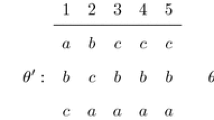Abstract
Two scenarios illustrate uses of von Neumann–Morgenstern stable sets in the construction of choice functions. A comparison is made to the construction of choice functions by the selection of maximal elements. A characterization is given of choice functions that are von Neumann–Morgenstern stable set rationalizable by acyclic, asymmetric binary relations. Two examples illustrate the use of the characterization.
Similar content being viewed by others
References
Afriat, S. (1967). The construction of a utility function from expenditure data. International Economic Review, 8, 678–777.
Anesi, V. (2006). Committees with farsighted voters: A new interpretation of stable sets. Social Choice and Welfare, 27, 595–610.
Anesi, V. (2010). Noncooperative foundations of stable sets in voting games. Games and Economic Behavior, 70, 488–493.
Anesi, V. (2012). A new old solution for weak tournaments. Social Choice and Welfare, 39, 919–930.
Anesi, V., & Seidmann, D. (2013). Bargaining over an endogenous agenda. Theoretical Economics, 9, 445–492.
Armouti-Hansen, J., & Kops, C. (2018). This or That? Sequential rationalization of indecisive choice behavior. Theory and Decision, 84, 507–524.
Arrow, K. (1950). A difficulty in the concept of social welfare. Journal of Political Economy, 8(4), 328–346.
Bossert, W., Sprumont, Y., & Suzumura, K. (2006). Rationalizability of choice functions on general domains without full transitivity. Social Choice and Welfare, 27, 435–458.
Bossert, W., & Suzumura, K. (2009). Rational choice on general domains. Arguments for a better world: Essays in Honor of Amartya Sen (Vol. I, pp. 103–135). Oxford: Oxford University Press.
Bossert, W., & Suzumura, K. (2010). Consistency, choice and rationality. Cambridge: Harvard University Press.
Bossert, W., & Suzumura, K. (2012). Quasi-transitive and Suzumura consistent relations. Social Choice and Welfare, 39, 323–334.
Brandt, F. (2011). Minimal stable sets in tournaments. Journal of Economic Theory, 146(4), 1481–1499.
Brandt, F., Brill, M., Seedig, H. G., & Suksompong, W. (2018). On the structure of stable tournament solutions. Economic Theory, 65(2), 483–507.
Diamantoudi, E., & Xue, L. (2007). Coalitions, agreements and efficiency. Journal of Economic Theory, 136, 105–125.
Dutta, B. (1988). Covering sets and a new Condorcet choice correspondence. Journal of Economic Theory, 44(1), 63–80.
Ehlers, L. (2007). Von Neumann–Morgenstern stable sets in matching problems. Journal of Economic Theory, 134, 537–547.
Greenberg, J. (1990). Theory of social situations. Cambridge: Cambridge University Press.
Han, W., Van Deemen, A., & Samsura, D. (2016). A note on extended stable sets. Social Choice and Welfare, 47, 265–275.
Herings, P., Mauleon, A., & Vannetelbosch, V. (2017). Stable sets in matching problems with coalitional sovereignty and path dominance. Journal of Mathematical Economics, 71, 14–19.
Houthakker, H. S. (1950). Revealed preference and the utility function. Economica N.S., 17, 159–174.
Knoblauch, V. (2016). Elections generate all binary relations on infinite sets. Mathematical Social Sciences, 84, 105–108.
Kultti, K., & Vartiainen, H. (2007). Von Neumann–Morgenstern stable sets, discounting and Nash bargaining. Journal of Economic Theory, 137, 721–728.
Lucas, W. F. (1969). The proof that a game may not have a solution. Transactions of the AMS, 137, 219–229.
Manzini, P., & Mariotti, M. (2007). Sequentially rationalizable choice. The American Economic Review, 97(5), 1824–1839.
Mauleon, A., Vannetelbosch, V., & Vergote, W. (2011). Von Neumann–Morgenstern farsightedly stable sets in two-sided matching. Theoretical Economics, 6, 499–521.
McGarvey, D. C. (1953). A theorem on the construction of voting paradoxes. Econometrica, 21, 608–610.
Penn, M. (2008). A distributive N-amendment game with endogenous agenda formation. Public Choice, 136, 201–213.
Samuelson, P. (1938). A note on the pure theory of consumers’ behavior. Economica N.S., 5(17), 61–71.
Sen, A. (1970). Collective choice and social welfare (1st ed.). San Francisco: Holden Day.
Vartiainen, H. (2015). Dynamic stable set as a tournament solution. Social Choice and Welfare, 45(2), 309–327.
Von Neumann, J., & Morgenstern, O. (1944). Theory of games and economic behavior. Princeton: Princeton University Press.
Wako, J. (2010). A polynomial-time algorithm to find von Neumann–Morgenstern stable matchings in marriage games. Algorithmica, 58, 188–220.
Author information
Authors and Affiliations
Corresponding author
Additional information
Publisher's Note
Springer Nature remains neutral with regard to jurisdictional claims in published maps and institutional affiliations.
I would like to thank an anonymous reviewer for a generous expenditure of time and effort and for many valuable suggestions.
Rights and permissions
About this article
Cite this article
Knoblauch, V. Von Neumann–Morgenstern stable set rationalization of choice functions. Theory Decis 89, 369–381 (2020). https://doi.org/10.1007/s11238-020-09755-3
Published:
Issue Date:
DOI: https://doi.org/10.1007/s11238-020-09755-3



